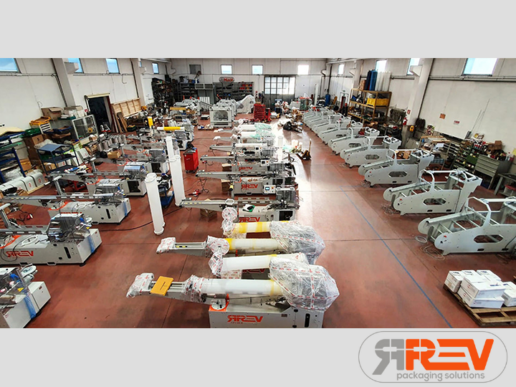Infoagro Exhibition 2023
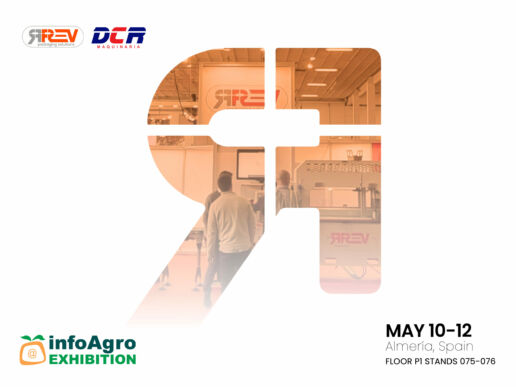
Save the date!
The fourth edition of Infoagro Exhibition, dedicated to intensive horticultural production and to the ancillary industry is about to start.
The event, which occurs every two years in Almería, Spain, and which will take place from 10th to 12th May, certainly represents a news with respect to other similar trade fairs that can boast a decades-long story; nevertheless, Almería is the core of the greatest greenhouse area as well as the most important vegetable cultivation centre in Europe.
Thus, in a short time Infoagro has become an unmissable appointment for the agricultural sector and related services, for presenting new products and ideas, keeping updated, discussing and, why not? even winning the reward as most influent company or person in the fruit-and-vegetable field!
With our trustworthy partner DCR, our Vega netting machine and much more, we await you on Floor P1, Stands 075 and 076!
Anti-waste digitalisation and technology
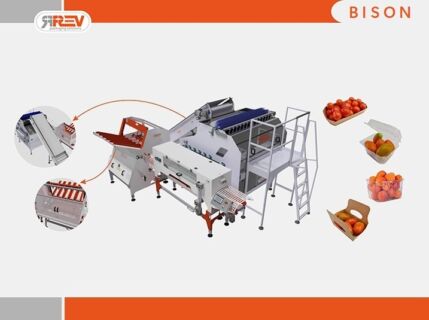
Bison evolves together with the market
Bison, precisely conceived for the filling of punnets, combined with the specific denester-filler, is a weigher designed in the name of innovation (and not surprisingly subject of international patent). It represents a constantly evolving project come, by now, to its seventh update.
The machine composes the packages according to a pre-arranged and never-lower weight; as a result, the giveaway is reduced to a minimum. Clearly, this corresponds to a remarkable advantage, especially for what concerns quality products and, thus, of great economic value.
According to the item to be weighed and the dose desired, it can be programmed with various “recipes” which allow to switch to a different production in a really practical way. And this is fundamental considering that Bison is suitable for an extremely wide range of fruit and vegetables: developed for delicate goods, above all with stone (apricots, plums, peaches, avocados, cherries, etc.), kiwis, both green and yellow, and tomatoes, during the transport it accompanies the fruits with maximum care, guaranteeing the least possible amount of impacts. The product falling is particularly reduced and is attenuated by outfeed conveyors now even softer. This aspect becomes even more relevant taking into account the recent tendency to bring on supermarket counters fruit and vegetables almost ready to be consumed, from ripening point of view.
Moreover, the new version is 20% faster with respect to the previous one, to parity of gentleness, and has been equipped with a software with advanced self-learning functions, which ensure continuity to the production, and with measures intended for a high level of automation, among which the automatic product-infeed according to the objective set, the Counting+Weight mode with check of the latter, the auto-tare, the verification of the scale remains with automatic product-anti-bridging system and the simplified end-of-production and emptying. That is to say, the most common settings have been limited for facilitating the operator.
From the new graphical interface it is possible to supervise the production statistics and to interact even-more intuitively with the machine, remotely too, thanks to the integrable teleassistance service Easy Remote.
But there is more; Bison, in fact, is providable with 4.0 Interconnection, is insertable into SCADA systems and features cutting-edge electronic components that make it extremely precise and really reliable, as well as very fast. How precise and how fast it depends on the needs: the balance between speed and accuracy can be adjusted by means of the dedicated function!
Also the structure has been perfected, for simpler and more efficient sanitisation and maintenance, and the infeed system improved, for an optimal distribution of the incoming product: at REV we aim at developing weighers that may be ever-more advanced, as well as gentle, in order to excel inside a scenery which is increasingly complex and competitive.
Supernova: super fast, super versatile!
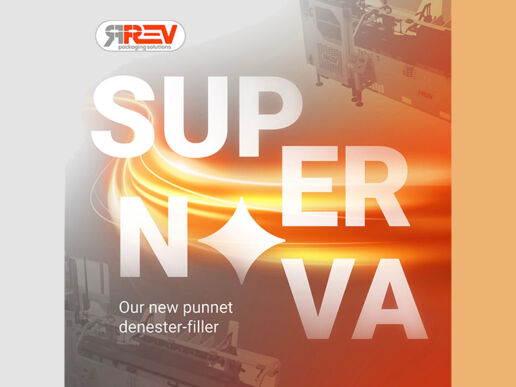
At REV a star is born
Supernova-Series V is the new highly automated and self-adjusting solution by REV, for the denesting (Supernova) and filling (Series V) of punnets of all kinds and sizes, from cardboard trays with or without wings and small crates to classic ones in plastic, including clamshells.
Supernova-Series V, in fact, is able to change format in some minutes and with absolute ease, guaranteeing at the same time and regardless of the container to be worked, maximum precision, delicacy, speed, great performances (that is to say more than 80 units per minute) and, thanks to some simple devices such as the particularly wide punnet tank and the smart warning signalling, a high production continuity.
The machine is equipped with quick-release outfeed funnels which allow to switch from a format to another in a few seconds and is programmable with various recipes, according to the punnet and the product to be worked.
Hence, the most common settings have been reduced to a minimum, for facilitating the operator: from the touch-screen panel it is possible to manage the machine smart movements with memory function. The machine will thus adjust itself in almost total autonomy: the only exceptions are some manual controls to be carried out also in an intuitive and immediate way, by means of the specific index knobs.
Moreover, Supernova, as well as combined with his filler Series V (specific for delicate products, thanks to conveyor belts which ensure particularly reduced fallings and the least possible amount of impacts), and therefore for picking up doses ejected by weighers, fruit counters or sorters, can also be used separately.
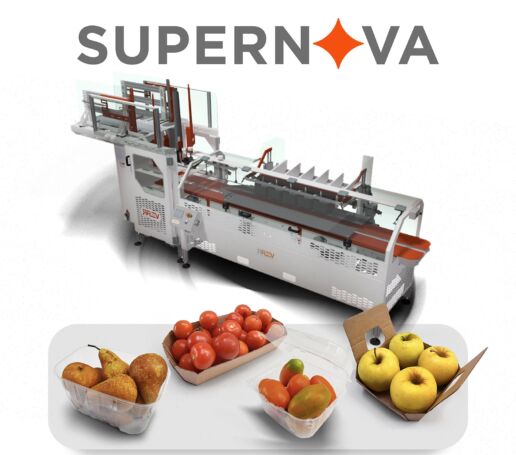
And in a context in which, due to the pandemic and the war-and-energy crisis, the market trend changes at rates that are unprecedented inside the sector of the packaging for fruit and vegetables and in which packagers are requested an ever-greater variety and smaller amounts of product, “versatility” becomes a synonym for “innovation”, on par with “speed and performances”.
In a historical period as the one we are living, then, technology and innovation cannot certainly prescind from the sustainability topic. Afterall, “to innovate” is precisely “to produce more spending less”, which means “to avoid waste for guaranteeing both economic and ecological advantages”.
Basically, a production more diversified and less massive which may also be sustainable and thus up to date in all and for all, necessarily implicates a greater flexibility of the machinery, which is possible only by investing in digitalisation, automation and mechanised production.
REV’s Supernova is all of that and much more: versatility, high concentration of technology, innovation and environmental protection, applied to the experience and expertise of who made of the denesting and filling the core business of his activity.
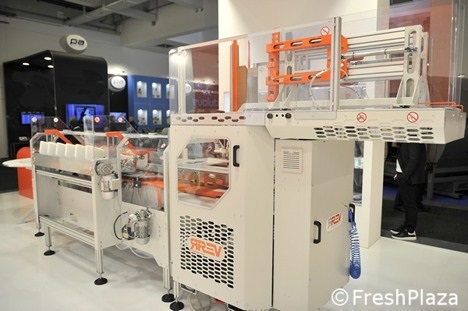
FRUIT LOGISTICA 2023
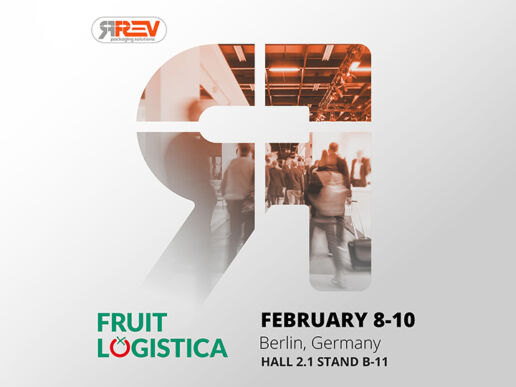
Shaping the future together
From 8th to 10th February, in Berlin, it returns the trade fair dedicated to the entire agri-food supply chain which represents a milestone for the industry, from growers to consumers: FRUIT LOGISTICA.
This year’s edition, especially for what concerns the exhibition area destined to the machines for the transformation, conservation and packaging of fruit and vegetables, will focus on technology and innovation which, of course, are not ends in themselves, but are rather aimed at reducing waste and at drawing the boundaries of a more tangible sustainability.
In fact, due to the pandemic and the war-and-energy crisis, the food & beverage sector, for a few years now, is facing new challenges, first of all the demand of greater variety and smaller amounts of product. And a sustainable production more diversified and less massive necessarily implicates a higher flexibility of the machinery, which is possible only by investing in digitalisation, automation and mechanised production.
And at REV we are working precisely on that! In which way? We await you at FRUIT LOGISTICA at Hall 2.1, Stand B-11 for discussing it in detail and for presenting to you our latest news!
SIVAL 2023: innovation, sustainability and internationalisation
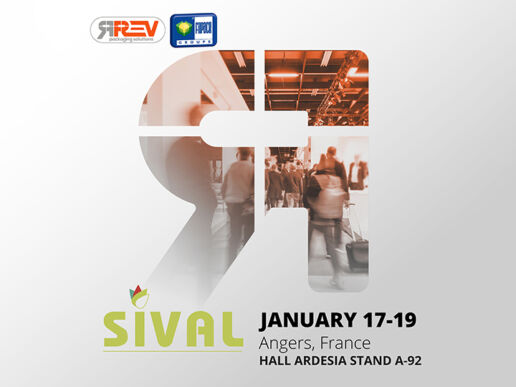
Towards the agriculture of the future
Angers, in France, is UNESCO heritage, as well as the capital of seed production and of specialised crops of flowers and of fruit-and-vegetable plants and of the transformation and the packaging of their products.
And precisely in Angers, from 17th to 19th January, it returns SIVAL, the fair dedicated to the agriculture of the future and related services and to all their players: more than 700 exhibitors will reunite for identifying (through conventions and workshops too) pioneering solutions, capable of guaranteeing an effective answer to the challenges of tomorrow, first of all, the one concerning climate changes.
How to do that? With a collective approach to the environmental issue: in addition to investing in automation and new technologies able to respect our planet, our health and biodiversity, for growing and evolving it is certainly necessary to globally cooperate.
REV and Filpack wait for you at Stand ARDESIA, Hall A-92, for showing you their proposals for a development that conform with the needs of the current generation as well as future ones and for discussing all together of innovation and sustainability.
Record numbers for packaging machines
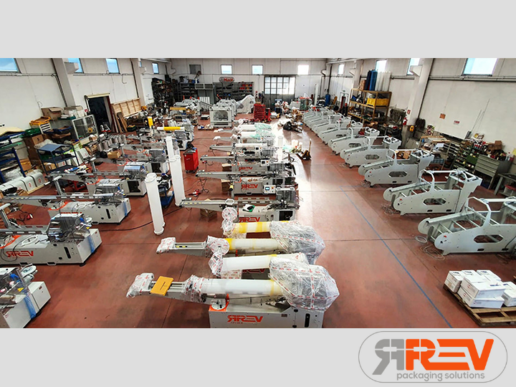
2022 to an end: the sector takes stock
The whole world is in environmental, pandemic, war-related and economic crisis. Nevertheless, 2022 closes really positively for Made-in-Italy packaging machines, which widely surpass pre-Covid performances.
With a 8,2-billion turnover and an export which amounts to nearly 80%, Italy confirms its leadership in the production of packaging machinery, especially for food and beverages.
After all, the business volume related to the packaging solutions for the food & beverage industry, which in the past two years already proved to be the driving branch, is globally worth 15.3 billion euros, with a 2.1% expected annual growth within 2025.
These data depict a scenery which is almost incredible if we consider that the industry had to face the pandemic and, thus, components which are difficult to find, delays and ever-higher costs first of all, and then the Ukrainian war and the resulting increase of energy prices and row materials.
And the fruit and vegetable sector in particular had to deal with quite-complex challenges: in fact, Eastern markets closing has worldwide rearranged trade flows, redirecting in Europe more or less 4 million tons of fruit and vegetables, causing an excess supply and a strong price pressure on local products.
But the sector not only held up, but it also excelled, investing in digitalisation, automation, mechanised processing and in innovation aimed at the ecological transition which, we all agree, can’t stop, must remain our priority. That is what Nomisma says: sustainable companies register a revenue 10% above average.
In conclusion, exactly as the vice president of UCIMA, the association of Italian manufacturers of automatic packaging machinery, wishes: “Made-in-Italy packaging, as world leader and pioneer of the development of sustainable solutions, has everything it takes to become the motive force for a green transformation of packaging materials and technologies on an international scale”.
The last two years speak clearly: paper and cellulose are the macrotrend of the moment
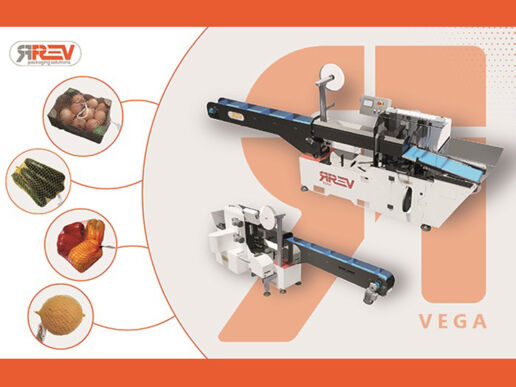
A new life for Vega
More and more frequently, in all areas of the public and private spheres, we hear about “sustainability”. What is it, exactly? For what concerns the food-packaging sector as well as more in general, “sustainability” certainly refers to “the capacity of a production-and-consumption model of meeting the needs of the present without spoiling the ability of future generations to meet their own needs”, to quote the former Norwegian prime minister, in addiction to mean, in the age of the revision of value chains in a green perspective, competitive advantage.
And for those buying, the sustainability score of the product also depends on its wrapping, which should be according to 62% of those polled by Nomisma’s Osservatorio Packaging del Largo Consumo recyclable, for 59% realised with environmentally friendly materials and, for 46%, with no excess grammage. “The awareness that a diet is healthy not only when is nutritionally adequate, but if it promotes human wellness and respects our planet, begins to spread”, says Slow Food Italia’s president, Barbara Nappini.
Thus, sustainability, but not at the expense of safety and of the product quality, which still remain important purchasing drivers and that are the reason why, in a scenario in which labels are synonym of a brand guarantee, and in which, as Marco Pedroni, president of Coop Italia remind us, “bringing loose produce on supermarket counters requires great efforts in terms of logistics and refrigeration, with an equally heavy impact in terms of emissions”, “packaged” is still preferable to “loose”. And speaking of environmentally friendly materials, according to common believes (more precisely in 41% of the cases), plastic free corresponds to ecological.
European legislation itself moves towards this direction: in France is already in force the prohibition of using polymers for packages of fruit and vegetables under 1,5 kg and soon, starting from 2023, Spain will adopt the same regulation.
Simultaneously, large-scale distribution too has to face environmental-protection issues and, globally, it has definitely been chosen the path of plastic reduction, when possible.
In such a context, our Vega, horizontal netting machine launched in 2015, is experiencing its period of maximum splendour.
Significanlty ahead of its time and now renewed in its graphical interface and optimised for satisfying 4.0-Industry requirements, Vega has been projected for creating different types of package of loose items such as fruits, citruses and vegetables up to 2 kg, as well as in punnets, trays and small cartons, by using woven or extruded net, in cellulose and natural fibres too, with a wineglass label, also in paper.
The net is then closed at the extremities with a metal clip which, currently, represents the only possible solution for cellulose. Undoubtedly, monomaterial packages are the goal to aim at and, of course, on the market there are bags in thermosealable paper, but it is necessary to remember that the wrapping must ensure a great visibility of its content, besides being sustainable and practical, for sure.
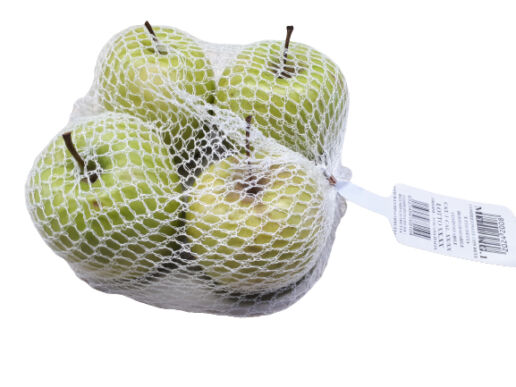
Taking into account all different necessities that the packaging is called to respond to and the limits set by the technologies we have, the metal clip constitutes the best compromise, especially considering that the consumer must be required the minimum effort in making use of the goods and in managing waste: the clip is easily removable from the package during differentiation and, above all, during recycling in disposal and recovery facilities!
A joint effort for countering global warming
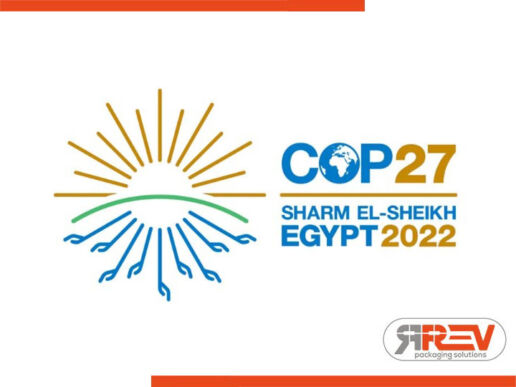
COP27 at the start
On 6th November, in Sharm el-Sheikh, it has begun COP27, the twenty-seventh United Nations Climate Change Conference.
At the centre of next weeks’ debate, themes which are particularly dear to us at REV: the reduction of greenhouse gas emissions, at the basis of global warming, and, more in general, the search of more effective and incisive sustainability models.
Basically, the action plan developed by ONU is divided into four points, separated and still closely related to each other: mitigation, adaptation, financing and cooperation.
The goal is always the same: to maintain the temperature increase within 2 degrees Celsius, aiming at 1,5, as well as, of course, to find pragmatic measures to deal with the current state of affairs, especially for what concerns more fragile and vulnerable realities, Africa first of all.
And all of this will be possible only by annually allocating an amount of funds appropriate to the extent of the crisis, that is to say, on average, more or less sixfold more than what invested so far.
The road is long and winding and the objectives really ambitious, hence, an inclusive and active participation of us all is needed, above all at institutional level, but in production process and individually, in everyday life, too.
REV, since ever, is committed to limit the packaging environmental impact and to design solutions that are not only highly productive, but which also best combine performances and ecology. Find out in detail our contribution to the cause: https://www.revsrl.com/en/sustainable-packaging-innovation/
Eco-solutions for a concrete circular economy
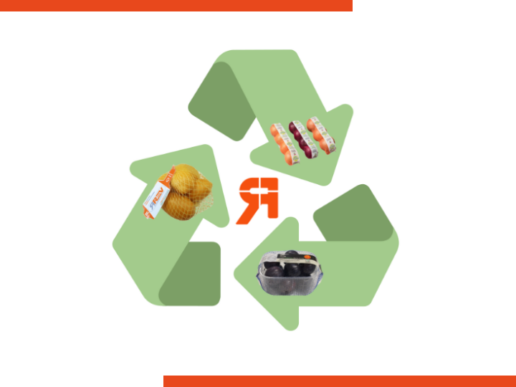
REV Packaging Solutions launches a new challenge: who will take it up?
Even though there is much left to do for carrying out the ecological transition already started in the early 70’s (and maybe only a miracle could save us from the climate crisis that we are going to face), we certainly took some timid steps forward.
Everywhere, is spreading a prevention culture in terms of environmental protection which has re-calibrated consumers’ moral compass and which brought new behavioural patterns intended to provide a pragmatic and effective response to the sustainability issue: evolution cannot prescind from environmental debate anymore, everyone wants (and has) to do its own part.
Last market researches highlight how, when choosing what to buy, in everyday life, besides the product quality (which remains constant at the top), a new variable enters the game: the environmental impact of the product and of its packaging and the negative effects that they will have on the planet.
More than 90% of the buyers is attentive to the ecosystem and to its protection. But there is more: according to recent statistics conducted by Comieco (National Consortium for the Recovery and Recycling of Cellulose-based Packaging), the perception the buyer has of a brand is increasingly strictly related to the sustainability of the product packaging and, in particular, to the ease of interaction with it, from its opening, up (and above all) to its disposal.
Something has changed but, for putting revolution into effect, visibility is required. And that is when large distribution comes into play: for dealing with the new eco-packaging demands, it is necessary to propose consumption models that correspond to the real needs of the customers and the community as a whole and which may allow, thus, a more conscious use.
And, after all, this is exactly the willingness to change that we builders have been wishing for (and on which we have been working) for years. But, how to proceed? First of all, it will be necessary that more and more production realities invest on new technologies and materials, which may be really sustainable. Then, overpackaging must be avoided and the range of biodegradable and compostable materials extended, of course. But, what makes a packaging for food use ideal? Firstly, it has to respect the product, by guaranteeing it high protection and preservation levels, by giving it great visibility and by conveying all necessary info, from the origin up to sales support. And from the point of view of food conservation, it is undeniable that plastic packagings still are the most functional ones, in most cases. What to do, thus? There is only one answer: monomaterial plastic.
Because if it is true that consumers’ sensitivity has increased with respect to separate collection, on the market there are still too many plastics coupled with other materials or with other types of non-recyclable plastic which, even worse, are often praised as the future of the industry. Coupled plastics may seem to be more high-performing during use but, at the end of their life cycle, are not reusable, in any way. On the contrary, a circular-economy project is based on the life prolongation of the packaging, not to mention that packages made of different materials, even when partially recyclable, are deceptive and, in any case, are not practical for consumers.
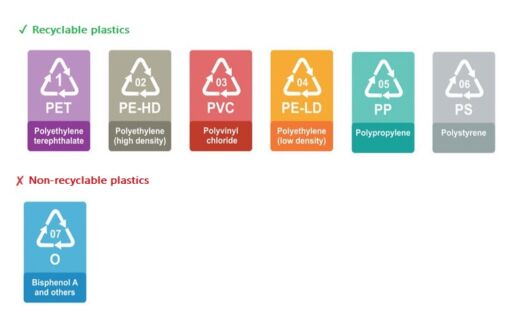
Monomaterial plastic (of wrappings, clingfilm and packages of different kinds), on the other hand, is easily disposable for both the final consumer and those companies deciding to invest in green solutions and, above all, can be reborn and become a new packaging able to ensure great performances.
It should also be considered that, currently, while paper is certainly recyclable but not reusable for food use, monomaterial plastic can be recycled (almost endlessly) keeping intact its properties. Therefore, if correctly recycled, plastic has a lower environmental impact with respect to any other material generally used for fruit-and-vegetable packaging, besides guaranteeing, this way, economic and environmental benefits.
At REV, committed to designing solutions for all types of specific needs, for years we have been realising machines for creating a monomaterial and totally recyclable packaging.
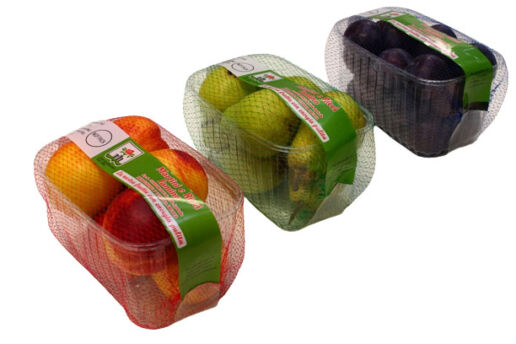
This is exactly the case of the netted punnets produced by Lion horizontal packaging machine in which, since 2010, the thermosealing technology substitutes the metal clip. The NGP-package innovation is represented by its perfect synthesis of economy and ecology (less plastic means lower costs for both production and disposal and a lower environmental impact), without compromising on the punnet aesthetic or functionality (on the contrary, the communicative space of the label has been improved compared to traditional packages). More specifically, NGP punnets have 20% less material with respect to metal-clip packages and 50% respect to our competitors’ similar punnets and, thus, ensure a 6% and 40% saving, respectively.
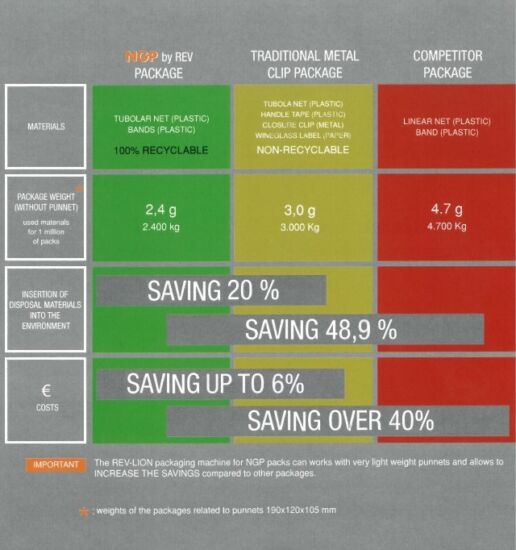
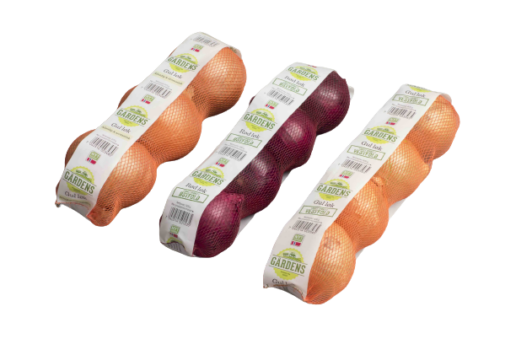
Other examples are Tiger, vertical packaging machine which eliminates the metal clip from packages of loose products in line, and Puma vertical netting machine that, besides realising 100%-recyclable packages (in bag or line) with no metal clip, like Tiger uses up to 50% less plastic compared to our competitors’ machines. Moreover, with all machines taking advantage of a thermosealing technology produced by REV, it is possible to use certified compostable materials (OK compost), instead of recyclable plastics.
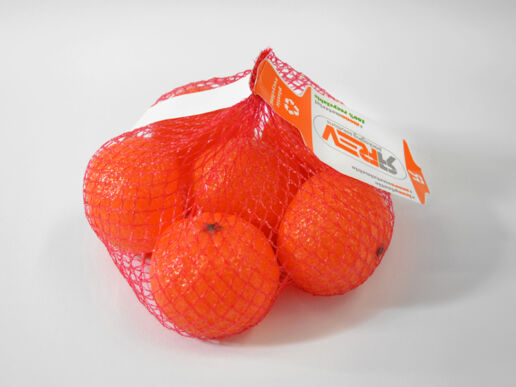
In sum, at REV we believe we all need a new approach to sustainability issue: a real investment in terms of time and projectuality is necessary. Of course news imply some risks but, even economically, the passage to monomaterial can only be beneficial, for packagers too. Those which have the power trigger thus the mechanism: this is REV’s appeal to the GDO and its invitation to join forces in this race against time. Keep in mind that “progress is impossible without change” (George Bernard Shaw) and that, above all, there is no planet B! Who will have the courage to make the first move?
Once again, to Berlin!
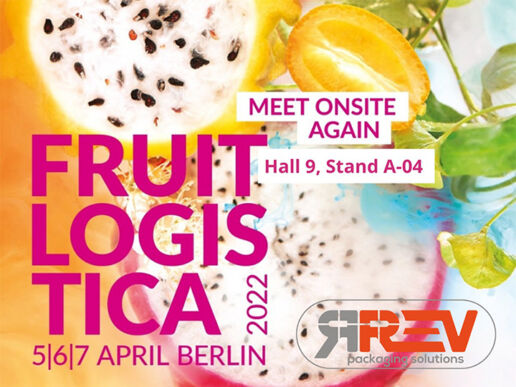
FRUIT LOGISTICA 2022: all set for departure
From 5th to 7th April it returns Fruit Logistica, the annual appointment with all news concerning the international trade of fresh produce and related services. The event, which globally represents a key point for the entire food-processing-sector supply chain, from production up to transformation and distribution, offers companies, buyers and suppliers from all over the world the opportunity of interfacing with each other and exchanging views on the future of the industry and of presenting their own idea of innovation.
Also this year, thus, REV brings to Berlin its sustainable-development project. Come find us at Hall 9, Stand A-04 to discover Elephant, our super new closing machine for cardboard trays (either flat or corrugated and, possibly, in other materials too) with side wings (also asymmetrical), capable of processing any product usually contained in trays, including most delicate ones and of realising monomaterial packages, wrap or flat type, by means of a hot-glue system, and doing it in the fastest possible way (Elephant is, indeed, the fastest and most versatile closing machine on the market), and to re-discover Puma, thermosealing netting machine which creates a packaging with no metal clip, compostable and 100% recyclable or with 50% less plastic.

